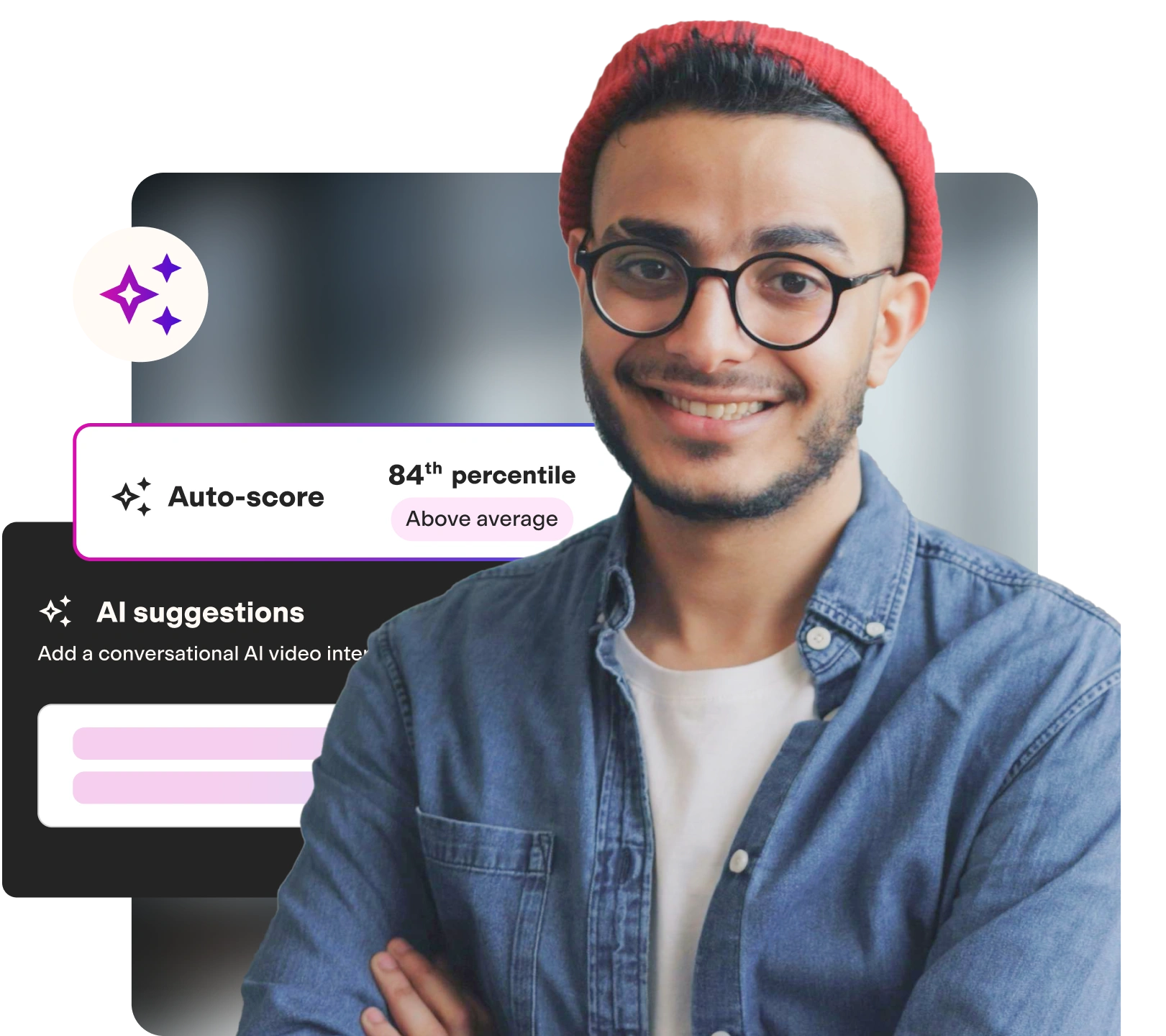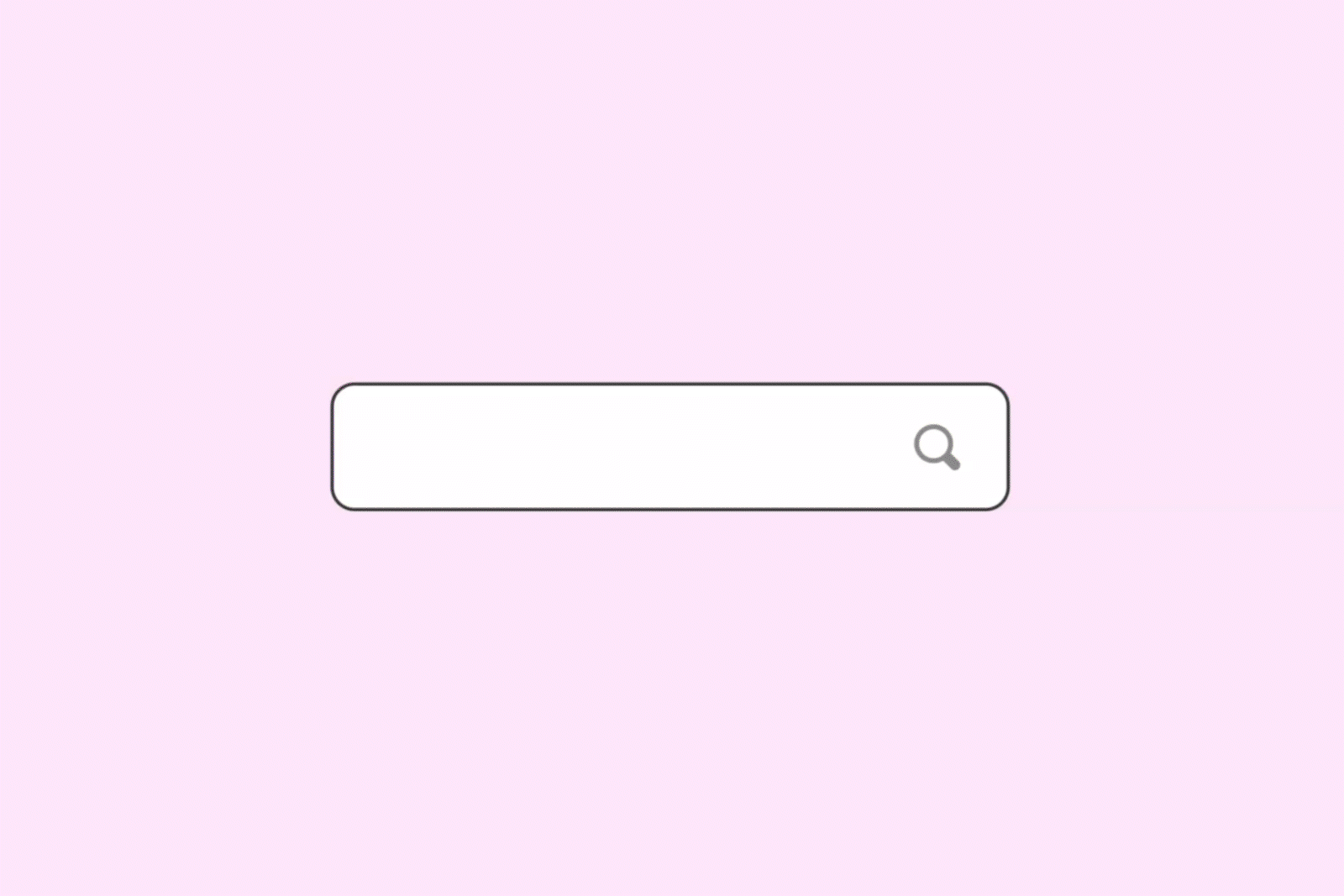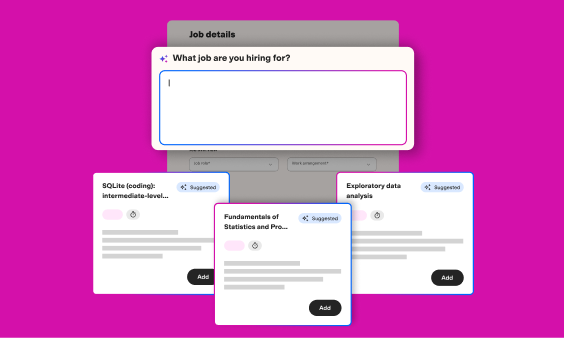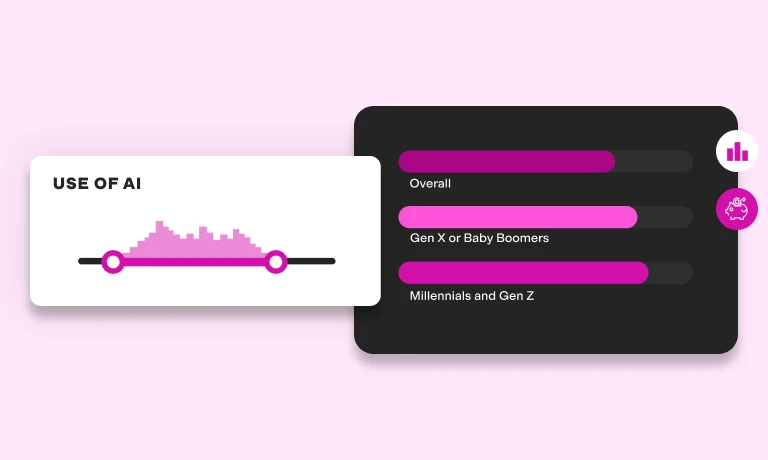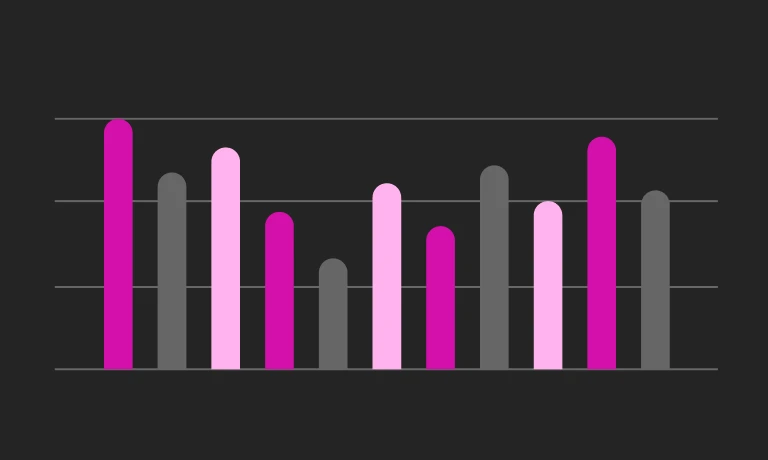AI that puts skills in the spotlight
Backed by science and centred on skills, our AI takes the guesswork out of screening. You stay in the driving seat while AI guides you to a shortlist of your strongest talent matches.
Our AI manifesto
We built our AI tools to help teams hire faster, fairer, and smarter. These are the principles that guide us.
Human-in-the-loop by design
Our AI never makes decisions for you. Every suggestion is fully editable, reviewable, and optional.
Focused on fairness
Our AI scoring is benchmarked against expert ratings and continually monitored to keep results fair.
Always transparent
We clearly disclose AI functionality to customers and candidates – no black boxes or hidden logic.
Private by default
We never train our AI on customer data, and no personal data is sent to or used by LLMs.
Tools, not gimmicks
Our AI solves real hiring challenges, like scoring open-ended answers and validating skills, so you can hire faster and smarter.
Designed for evolving standards
We monitor emerging AI regulations and continuously improve our safeguards to meet new expectations.
Our framework for AI fluency
Use TestGorilla to assess for the 5 components of AI-fluency – based on a framework designed by our experts.
Applied AI use
When and where does AI work, and what are its technical limitations. Choose from MCQ-based AI-skills assessments to identify the right candidates.
Learning and digital ability
Learning new AI workflows quickly and adapting when tools or constraints change (positively or limitations) to translate emerging technology into productivity gains.
Systems thinking & problem solving
AI-fluent talent can frame ambiguous problems, deconstruct into tasks, and reason about how AI decisions ripple across systems. Measured by the right skills test.
Responsible and ethical AI use
AI-fluent professionals recognize bias, privacy, and governance challenges, documenting decisions and building safeguards. Because “moving fast” must still mean “moving responsibly”.
Human-AI collaboration
Our AI interviews can identify AI-fluent talent that can communicate assumptions, prompts, and outputs clearly, knowing trade-offs, and maintaining transparency in shared workflows.
AI that unlocks real hire power
Not your average AI. Backed by decades of I-O psychology expertise and skills-based hiring data, we’ve built features that cut through the noise.
You ask. We answer.
Our AI insights
We're changing how assessments begin: Introducing our AI recommender
Hiring managers shouldn’t have to moonlight as IO psychologists. But that’s what often ends up happening when building assessments from scratch. You start with a role in mind. Then what? You try to guess which skills matter, dig through a test library, and hope you land on the right combination. It’s inconsistent. It’s time-consuming. And no two hiring managers build the same assessment for the same role. That’s why we’re changing how assessments begin at TestGorilla.
What does it mean to hire for skills in the era of AI?
AI is changing the world of work, and fast. 7 in 10 employers are integrating AI, with 65% now using it in the hiring process. The remit of what AI can do now is growing, and its potential for the future is beginning to feel somewhat boundless. Amidst the AI craze, its ability to replicate certain human skills stands out as something that we, as advocates of skills-based hiring, want to address. The rise of AI tools like ChatGPT has raised questions about which skills will be replaced and which skills we should continue to invest in. It has also triggered a wave of paranoia amongst workers (will AI take my job?) and an onslaught of productivity-related content about the “skills you no longer need to learn” and the “things you no longer need to do yourself.” One euronews article suggests writing and art design are skills we might skip learning entirely (yikes). [1] So here’s the thing. We know that the future of hiring is skills-based, and we know that many organizations are indeed implementing skills-based hiring. But we also know that, in the minds of many employers and employees, some skills have entered an AI-induced jeopardy. The question for employers is no longer “should I hire for skills?” – instead, they must consider a new and important question: How do I hire for skills in the era of AI? We happen to have a big take on this one. Let’s dive in.
How to hire for AI proficiency (without getting fooled by buzzwords)
Staying competitive in today’s business environment requires quickly adopting artificial intelligence (AI) tools and providing a seamless AI experience for employees and customers. That, in turn, means you need a team of highly skilled AI engineers or other AI professionals who can build, apply, and manage AI systems at scale. However, finding talented AI-proficient job candidates can be tough. Resumes are chock-full of AI buzzwords, and applicants routinely oversell their experience. So, it’s important to know what to look for during the hiring process and how to use role-based skills tests – like our AI test – to assess candidates. Keep reading to learn how to hire for AI proficiency today.
Job seekers might be using AI less than you think
AI has made its way into nearly every corner of the working world, and hiring is no exception. Most employers are using AI in recruitment in some way, shape, or form. Naturally, they assume job seekers are doing the same. We surveyed employers and job seekers for our most recent annual The State of Skills-Based Hiring report – and 73% of employers told us they’ve seen a spike in AI-generated resumes. But here’s the twist: Only 37% of candidates say they’re using AI in their job applications. That’s a surprisingly low number considering the hype. So, what’s going on? Below, I unpack how candidates feel about using AI and why it isn’t dominating job applications the way everyone assumes.
Is AI ready to interview job applicants? Your guide to using AI for interviews
AI is making their way into hiring funnels everywhere. Our research shows 65% are using it in their hiring process, and 1 in 5 are even using AI to interview candidates. But what are the implications of this? Are these tools really ready to interview candidates without any human involvement? Is it too far to use AI to interview your candidates? The consensus between job seekers is that it is. if they've made it to the interview, they want to speak to a person, not a bot. At TestGorilla, we know there are ways to use AI interviews safely and conscientiously in your hiring process. In this article, we look at some of the risks with AI interviews and share how to use AI correctly so you can evaluate with confidence.
32 crucial AI statistics for TA leaders and recruiters
AI is taking the world by storm. But HR leaders and recruiters want to know: How exactly is it impacting hiring? We survey thousands of job seekers and employers every year to bring you The State of Skills-Based Hiring, and this year we asked them questions about AI. I’ve compiled all of the AI-related statistics from our report for you here. Let’s dive in.
Human scoring can swing unpredictably depending on mood, fatigue, or even the time of day. Our AI scoring tool, by contrast, never has an ‘off’ day. It delivers steady, reliable evaluations for every applicant, no matter when or where.

